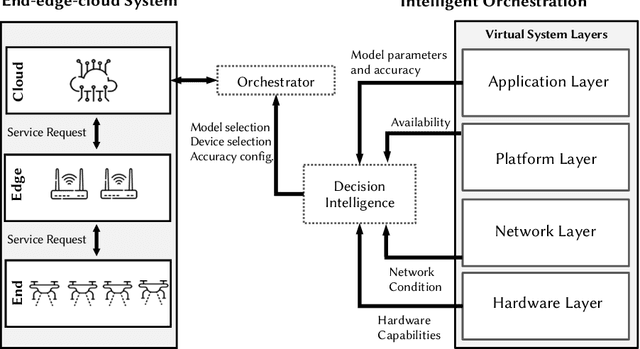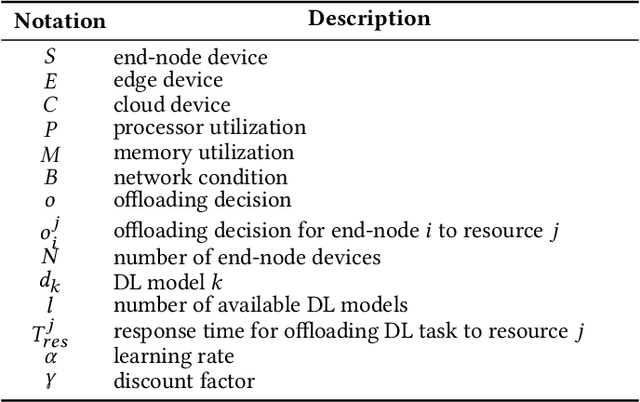Bryan Donyanavard
Hybrid Learning for Orchestrating Deep Learning Inference in Multi-user Edge-cloud Networks
Feb 21, 2022



Abstract:Deep-learning-based intelligent services have become prevalent in cyber-physical applications including smart cities and health-care. Collaborative end-edge-cloud computing for deep learning provides a range of performance and efficiency that can address application requirements through computation offloading. The decision to offload computation is a communication-computation co-optimization problem that varies with both system parameters (e.g., network condition) and workload characteristics (e.g., inputs). Identifying optimal orchestration considering the cross-layer opportunities and requirements in the face of varying system dynamics is a challenging multi-dimensional problem. While Reinforcement Learning (RL) approaches have been proposed earlier, they suffer from a large number of trial-and-errors during the learning process resulting in excessive time and resource consumption. We present a Hybrid Learning orchestration framework that reduces the number of interactions with the system environment by combining model-based and model-free reinforcement learning. Our Deep Learning inference orchestration strategy employs reinforcement learning to find the optimal orchestration policy. Furthermore, we deploy Hybrid Learning (HL) to accelerate the RL learning process and reduce the number of direct samplings. We demonstrate efficacy of our HL strategy through experimental comparison with state-of-the-art RL-based inference orchestration, demonstrating that our HL strategy accelerates the learning process by up to 166.6x.
Online Learning for Orchestration of Inference in Multi-User End-Edge-Cloud Networks
Feb 21, 2022



Abstract:Deep-learning-based intelligent services have become prevalent in cyber-physical applications including smart cities and health-care. Deploying deep-learning-based intelligence near the end-user enhances privacy protection, responsiveness, and reliability. Resource-constrained end-devices must be carefully managed in order to meet the latency and energy requirements of computationally-intensive deep learning services. Collaborative end-edge-cloud computing for deep learning provides a range of performance and efficiency that can address application requirements through computation offloading. The decision to offload computation is a communication-computation co-optimization problem that varies with both system parameters (e.g., network condition) and workload characteristics (e.g., inputs). On the other hand, deep learning model optimization provides another source of tradeoff between latency and model accuracy. An end-to-end decision-making solution that considers such computation-communication problem is required to synergistically find the optimal offloading policy and model for deep learning services. To this end, we propose a reinforcement-learning-based computation offloading solution that learns optimal offloading policy considering deep learning model selection techniques to minimize response time while providing sufficient accuracy. We demonstrate the effectiveness of our solution for edge devices in an end-edge-cloud system and evaluate with a real-setup implementation using multiple AWS and ARM core configurations. Our solution provides 35% speedup in the average response time compared to the state-of-the-art with less than 0.9% accuracy reduction, demonstrating the promise of our online learning framework for orchestrating DL inference in end-edge-cloud systems.
 Add to Chrome
Add to Chrome Add to Firefox
Add to Firefox Add to Edge
Add to Edge